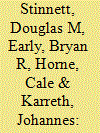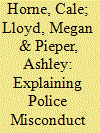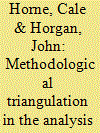|
|
|
Sort Order |
|
|
|
Items / Page
|
|
|
|
|
|
|
| Srl | Item |
| 1 |
ID:
106357


|
|
|
|
|
| Publication |
2011.
|
| Summary/Abstract |
The adoption of UN Security Council Resolution (UNSCR) 1540 in 2004 reflects an emerging consensus that more should be done by the international community to address the proliferation of weapons of mass destruction. UNSCR 1540 articulates a universal, legally binding obligation for all states to confront proliferation by adopting effective export control systems. To date, however, there have been no attempts to systematically analyze compliance with this new obligation, making it impossible to assess the success of this measure and the underlying causes of any shortcomings. This study addresses this by conducting a systematic empirical analysis of state compliance with UNSCR 1540. Drawing upon theories of compliance with international law, we investigate two distinct explanations for variation in the degree to which states adopt nonproliferation export controls: one based on state interests and enforcement and the other based on state capacity. Our statistical tests of these theories use a new, cross-national data set detailing the nonproliferation policies of 30 states. The empirical results indicate that compliance with international nonproliferation obligations is influenced most by a state's economic and governmental capacities and has little to do with interest-based factors. These findings suggest that capacity-building programs are the best option for improving the implementation of UNSCR 1540 and of nonproliferation efforts in general.
|
|
|
|
|
|
|
|
|
|
|
|
|
|
|
|
| 2 |
ID:
190151


|
|
|
|
|
| Summary/Abstract |
Several recent studies consider the determinants of misconduct by military personnel deployed to United Nations peacekeeping operations (PKOs). While the majority of peacekeepers carry out their duties honorably and often at great personal risk, these studies operate from the premise that misconduct by even a few peacekeepers can undermine a mission, and reduce support for future missions. Even so, misconduct by civilian police deployed to PKOs remains massively understudied in comparison to their military counterparts, though UN police are more likely to face credible allegations of misconduct compared to UN troops. Based on the inclusive or extractive incentives of contributor states, we find support for the argument that the behavior of security personnel at home readily predicts misconduct when deployed to PKOs. This same logic has implications for the UN's increasingly preferred ‘Formed Police Units,’ whose use may actually increase the likelihood of sexual exploitation and abuse.
|
|
|
|
|
|
|
|
|
|
|
|
|
|
|
|
| 3 |
ID:
110005


|
|
|
|
|
| Publication |
2012.
|
| Summary/Abstract |
The conceptualization of terrorist groups as networks is increasingly common to terrorism studies, although methods of analysis vary widely. Contrary to common understandings, the integration of computational and qualitative methods is possible even with limited (small-n) data. The triangulation of different methods can produce insights overlooked by the use of any single method and validate findings across methods. This article demonstrates some of the possibilities for integrating qualitative and quantitative methods for network analysis using Raffaello Pantucci's recent article, "The Tottenham Ayatollah and The Hook-Handed Cleric: An Examination of All Their Jihadi Children."
|
|
|
|
|
|
|
|
|
|
|
|
|
|
|
|
| 4 |
ID:
171850


|
|
|
|
|
| Summary/Abstract |
Recent research has begun to examine patterns of sexual exploitation and abuse (SEA) perpetrated by peacekeepers deployed in United Nations (UN) peacekeeping operations (PKOs). Yet, SEA makes up only a fraction of credible allegations of misconduct by peacekeepers. In this article we explore the contours of misconduct in UN PKOs beyond SEA allegations. We argue that the behavior of military forces in their own countries should easily predict their behavior when deployed as part of UN PKOs, which are typically set in fragile, postconflict countries where civilians have minimal protections or legal recourse. Using an original dataset of misconduct in PKOs from 2009 to 2016, we find the behavior of PKO contributor states toward their own populations strongly and consistently predicts the behavior of these states’ military forces in UN PKOs. These findings have implications for the vetting, supervision, and composition of PKOs.
|
|
|
|
|
|
|
|
|
|
|
|
|
|
|
|
|
|
|
|
|